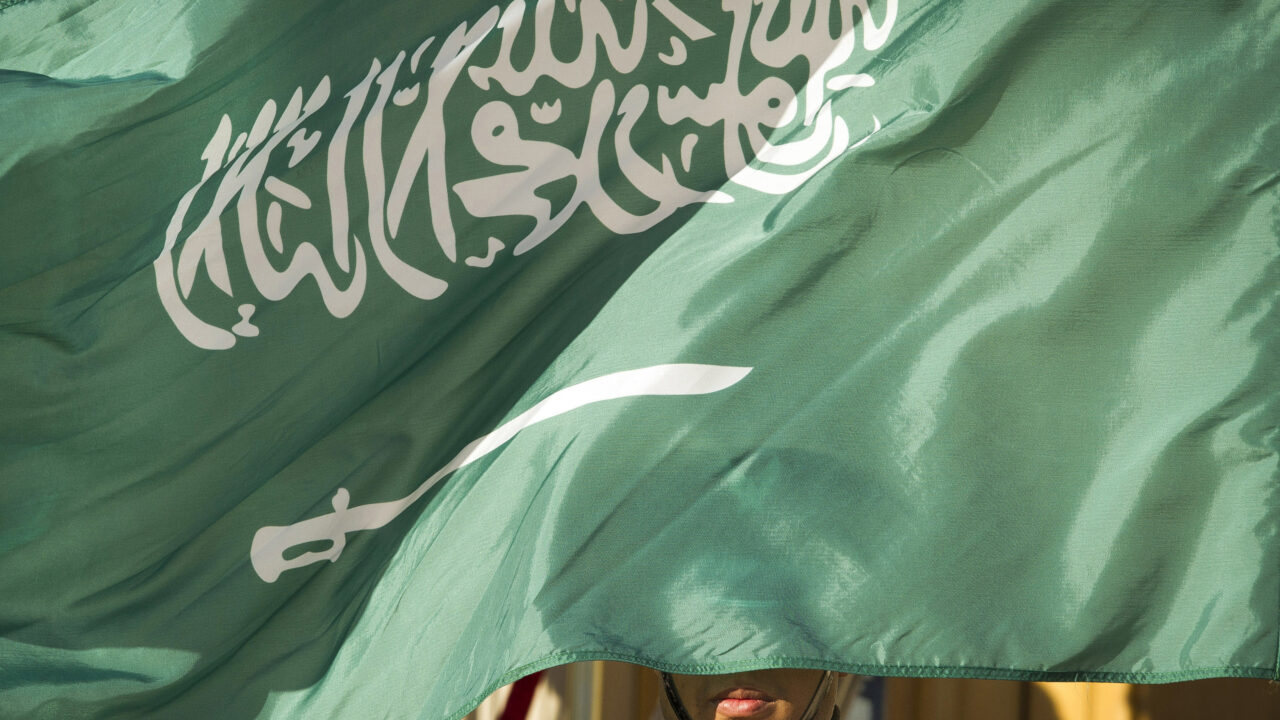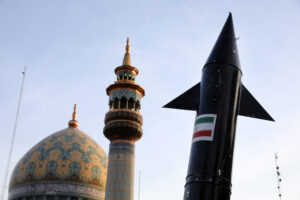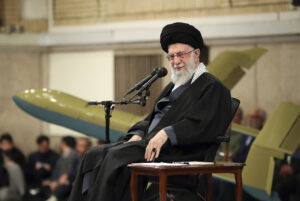We Cannot Be a Party to Uranium-Enrichment in Saudi Arabia
The Biden administration must commit to more stringent nonproliferation standards in the wake of recent comments and actions by the kingdom. In this March 22, 2018, file photo, an honor guard member is covered by the flag of Saudi Arabia, in Washington. (AP Photo/Cliff Owen, File)
In this March 22, 2018, file photo, an honor guard member is covered by the flag of Saudi Arabia, in Washington. (AP Photo/Cliff Owen, File)
Curbing the spread of nuclear weapons and the uranium-enrichment and spent fuel reprocessing technologies needed to make them has long been in U.S. security interests. Today, this is especially true in the troubled Middle East, where one state, Israel, already is nuclear-armed, and another state, Iran, has amassed a substantial uranium-enrichment capacity. The challenge of containing Iran’s capabilities has grown significantly since U.S. President Donald Trump pulled out of the successful Iran nuclear deal in 2018.
Further troubles loom ahead. In a Sept. 20 interview on Fox News, Saudi Arabia’s de facto ruler, Crown Prince Mohammed bin Salman, reiterated his threat that “[i]f Iran obtains a nuclear weapon, we must obtain one as well.”
In January 2023, Saudi Arabia’s energy minister, Prince Abdulaziz bin Salman, told a mining and industry conference in Riyadh that the oil-laden kingdom plans to enrich uranium stocks to ensure its ability to complete “the entire nuclear fuel cycle.” The Saudis have also purchased nuclear-capable Dongfeng-3 ballistic missiles from China and are manufacturing ballistic missiles that could provide the means to deliver nuclear weapons against an adversary, according to a 2022 U.S. intelligence assessment.
Whatever value a Saudi-Israeli rapprochement may serve, it must be measured against the potential damage to other long-standing U.S. and international security interests.
Disturbingly, no Biden administration official has publicly condemned the latest Saudi threat to acquire nuclear weapons if Iran does. Worse yet, The New York Times and The Wall Street Journal report that a small circle of senior Biden administration officials is engaged in active, high-level talks to supply the kingdom with a U.S.-run uranium-enrichment operation, among other nuclear supply alternatives, as part of a complex three-way deal to establish official diplomatic relations between the Saudis and the Israelis.
Whatever value a Saudi-Israeli rapprochement may serve, it must be measured against the potential damage to other long-standing U.S. and international security interests. Saudi Arabia’s brazen nuclear weapons hedging is a profound threat to the global nonproliferation regime that the United States has led for decades.
The United States has never before contemplated, let alone negotiated and concluded a nuclear cooperation agreement with a state that is threatening to leave the nuclear Nonproliferation Treaty (NPT), and for good reason.
Unnamed Biden officials have issued vague pledges that “whatever is done regarding civil nuclear cooperation with Saudi Arabia or anybody else will meet stringent U.S. nonproliferation standards.” Such statements are hardly reassuring given Saudi Arabia’s stated intentions and given that the modest standards for nuclear cooperation, contained in section 123 of the 1954 U.S. Atomic Energy Act, are insufficient and out of date.
The Biden administration must commit to, and Congress must insist on, more stringent nonproliferation standards. To start, the United States must maintain its position that Saudi Arabia sign and ratify an additional protocol to its safeguards agreement with the International Atomic Energy Agency (IAEA), which allows expanded agency access to information, sites, and materials to guard against military diversion. Saudi Arabia is one of the few countries that has refused to adopt such a protocol.
But tougher IAEA safeguards are not enough. The United States must seek a legally binding Saudi commitment not to pursue or acquire enrichment and reprocessing technology. Such technology is unnecessary for the kingdom’s future nuclear energy or commercial pursuits.
The absence of such a provision would depart from the policy pursued by the three prior U.S. presidents and open the door for the kingdom to pursue fuel cycle capabilities without U.S. approval, possibly igniting a regional nuclear arms race. A typical 123 agreement merely requires that the United States consent to any request to enrich or reprocess uranium if the material is of U.S. origin.
The United States must seek a legally binding Saudi commitment not to pursue or acquire enrichment and reprocessing technology.
Washington also should press the Saudis to sign the 1996 Comprehensive Test Ban Treaty and stipulate that U.S. nuclear cooperation will be terminated if Saudi Arabia conducts a nuclear test explosion, violates IAEA safeguards, or seeks to acquire enrichment or reprocessing technology.
If the Biden administration or a future administration concludes a 123 agreement with Saudi Arabia that does not contain adequate nonproliferation guardrails, Congress, which has the right to block the agreement, should condition its approval on the adoption of these or other higher nonproliferation standards.
U.S. and global efforts to prevent proliferation have been more successful when U.S. presidents and Congress insist on high barriers to the transfer of sensitive enrichment and reprocessing technology. We have seen setbacks and failures when they make exceptions for “friends“ and “partners.”
In his speech to the UN General Assembly on Sept. 19, President Joe Biden vowed that the United States would “lead by example on curbing weapons of mass destruction.” To succeed, he will need to walk the talk and avoid making compromises and exceptions for Saudi Arabia.
Your support matters…Independent journalism is under threat and overshadowed by heavily funded mainstream media.
You can help level the playing field. Become a member.
Your tax-deductible contribution keeps us digging beneath the headlines to give you thought-provoking, investigative reporting and analysis that unearths what's really happening- without compromise.
Give today to support our courageous, independent journalists.






You need to be a supporter to comment.
There are currently no responses to this article.
Be the first to respond.